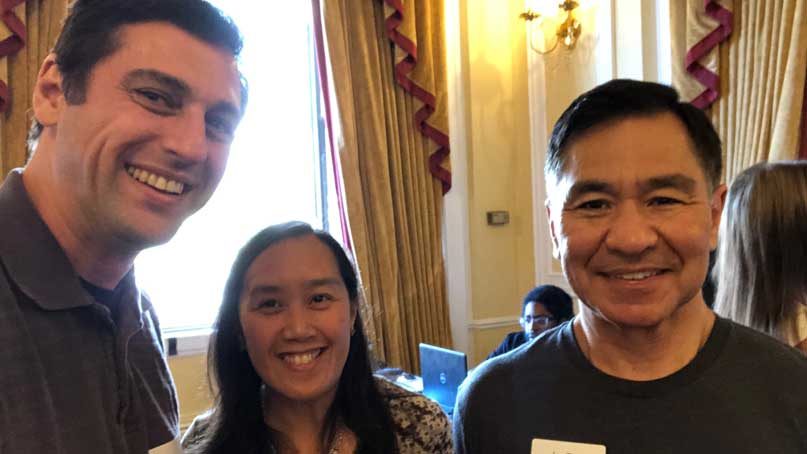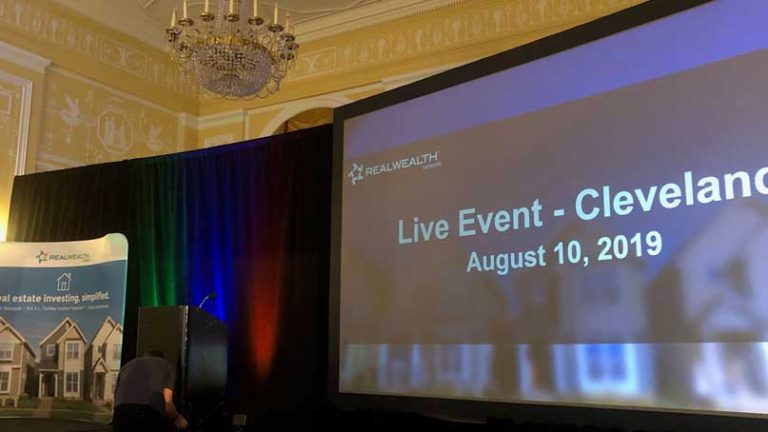Scott and I took a work/ play road trip to Cleveland for the 2019 Real Wealth Eastern Income Property Showcase Event. Real Wealth Network is a real estate education and referral network that partners with turnkey providers in various markets. Based in California, they do most of their conferences out west, but once a year they go further east to capture investors on our side of the country.
This post is all about the Real Wealth Network event, but you can click here to read about the other things we did on the weekend-long trip.
Real Wealth Network also has a syndication project in Costa Rica, which is how they initially came on my radar. We’re still considering that project but not 100% convinced about syndications (stay tuned for that subject in another post).
Getting personal on the ups and downs of real estate
Rich & Kathy Fettke, co-founders & co-CEOs of Real Wealth Network, opened the event with the details of their story, which includes both the highs and lows of their entrepreneurial and business journey.
In addition to being motivational, their highs and lows highlighted several key takeaways:
Up: Real Wealth Network has been listed in the Inc 5000 for the last 3 years so currently on the up. While this is surely a testament to their business-building prowess, the volatile market helps explain the increased interest in real estate as an alternative.
Key takeaway: get in front of a growing market.
Down: However, they came to real estate accidentally and during a low period. in 2003, a cancer diagnosis for Rich left him with the idea he had less than a year to live. At the time, Kathy was a stay-at-home mom with their two daughters and only working in an unpaid job running a radio show. Scrambling to shore up income for Kathy, they refocused the radio show on passive income topics, so Kathy could figure out income sources for herself.
Key takeaway: wherever you are, you have enough to get started. Kathy had a free radio show which she used as a platform for her own learning and development.
Up: The radio show landed a mortgage broker sponsor, so real estate became the passive income source of choice. The radio show landed Robert Kiyosaki as a guest in 2004 (so well before the nationwide real estate boom), and he turned them on to the upswing in Texas real estate. They made some successful investments there, and more importantly, Rich’s medical diagnosis turned out to be a mistake!
Key takeaway: pay attention to nascent opportunities, like Kiyosaki’s early tip, and be prepared to act on them.
Down: The recession in 2009 tanked their real estate investments in California and Idaho, and they lost one of their California properties to foreclosure.
Key takeaway: risk management is key. No portfolio is bulletproof, and even experts stumble.
Up: The Fettkes decamped to Malibu from San Francisco and ended up renting beachfront property at half the cost.
Key takeaway: 1 – sometimes it’s better to rent, so you really should run the numbers; 2 – you can start over.
Down: After a few years of growth from 2010-2013, their real estate company expanded from the radio show to a membership of ~10,000 and provided real estate training and fundraising for syndication deals. However, they topped out, and communication among their team of 8 started breaking down.
Key takeaway: your business/ career will change over time, and you have to adjust.
Up: They clarified the vision for their company, got some business coaching and landed on the Inc 5000 by 2016, a feat they repeated in 2017 and 2018. They are now up to 46,000 members.
Key takeaway: get clear about your goals, and get help to get there.
We meet Joe Torre!
After finishing their personal story, the Fettkes introduced their staff, and we met Joe Torre!

As you can see, this Joe Torre is clearly not the Joe Torre who once managed the New York Yankees, but one of their investment counselors. This worked out better for us, as Scott is a big Mets fan so we didn’t have to leave the conference on the spot! (Scott’s aside: I remember Joe Torre as a player and manager for the Mets from way back in the 1970, so it’s all good)
Joe was actually the investment counselor who vetted us when we joined Real Wealth Network to view their deals. All members are required to have a phone call where your appetite and level of readiness to invest is vetted. Our call was quick because we have already done a number of real estate transactions. I don’t know how rigorous the call gets if you’re new to investing.
Real Wealth Network update on 15 growing real estate markets

The rest of the jam-packed 8-hour day included 20-minute updates on 15 different real estate markets, including 4 in Florida alone — Jacksonville, Tampa, Central, and Orlando. Alabama and Ohio each had 2 featured markets — Birmingham and Huntsville/ Montgomery for Alabama and Cincinnati/ Dayton and Cleveland for Ohio. The other markets covered included Atlanta, Chicago, Detroit, Pittsburgh, Indianapolis, Houston and Albuquerque (with a single turnkey provider representing both Houston and Albuquerque).
Kansas City, MO had been scheduled but was off the final agenda. I think Real Wealth still has an affiliate there, but just didn’t have that provider available to speak. Regardless, we had ruled out Kansas City as being too far for us – we prefer to be in a geography we know we’ll be able to get to quickly. If Kansas City were closer, we’d be interested – we’ve visited twice, and it’s a fun road trip!
Each market representative talked about why their bullish on their area. Some of the key factors considered included job growth, population growth, employment diversification, favorable tax conditions, favorable landlord conditions and either a growth market or at least a stable, high cash flow market. Atlanta, Houston and the Florida markets were cited as growth areas, where you could expect to see short-term appreciation on your properties. The other markets were touted as little appreciation, but little downside risk. (If you’re debating on what investment approach makes sense for you, see our earlier blog post on whether to invest for cash flow or appreciation!)
None of the market updates featured big news, as the sources cited included commonly available business lists, such as the Fortune 500 or Forbes’ pick for best cities for business. I appreciated the drill down on specific neighborhoods, but with 20 minutes per area, this was still just an overview. If you’re interested in a geography, you reallly have to do your own research.
I agree with the factors that many of the market representatives cited, particularly employment diversification and job growth. Specifically, you want to verify where key employers are located, access to highways or other markers of reasonable commutes, rents in the commutable neighborhood, and schools by neighborhood. In addition to population growth, you want to look at income growth, especially as we may be headed into a recession. As a landlord, you want your tenants to be able to afford the rent!
Turnkey deals are currently not good deals

We have written before about how turnkey real estate investing is not as passive as it is often sold. We have not worked with any of the Real Wealth Network turnkey providers, but with other groups that we sourced from other real estate communities.
In our experience, turnkey providers present an over-optimistic projection of returns based on underestimating the reserves you’ll need for vacancy costs, maintenance and capex (i.e., capital expenses like installing a new roof or HVAC system). In investment projects showing returns of 8-15%, turnkey providers we vetted were using 5% for vacancy and 5% for maintenance with zero capex modeled into the returns.
While maintenance and capex will vary, they will likely be more than 5%, especially if the property is a resale and not brand-new construction. However, 5% vacancy is clearly too low.
Any vacancy will cost the landlord a minimum of two months of rent, including the loss of rent while the unit is vacant, turnover costs to prepare the unit to be re-rented and placement fees paid to the property manager to find the next tenant. For two months of rent to only equal 5% of your collected rents, it implies that you would only have a vacancy every 40 months or 3.33 years. Average tenant stays are not over 3 years – property managers brag about tenant tenure numbers of two years or more. I would conservatively budget 1.5-2 years for your average tenant turnover (though always aiming for more, of course).
At this conference, the numbers shared for each deal were even more optimistic because there were zero reserves included in the calculations. A footnote recommended that you set aside 3-6% for reserves, not even 10%.
The footnoted 3-6% was not included in the numbers, and even without that, the deals as shown were already too thin. The Jacksonville investments projected cash-on-cash returns under 5%. This matches what we have recently seen – which is why we have not been recently buying ourselves.
Buying through a turnkey provider (any provider, whether through Real Wealth Network or somewhere else) would add their fees onto the deal. You don’t see the fees, they are baked into the purchase price.
The supposedly high-cash-flow markets, such as Birmingham, Cleveland, and Detroit, showed 10+% cash-on-cash returns, but again without the reserves factored in. Setting aside 10% for reserves would take you to break-even or less. Setting aside a more realistic 15% would take you into negative cash flow territory.
Find your own deals or be the dealmaker
We are still glad we went to the event because it confirmed our suspicion that we need to find our own deals and not rely on turnkey providers. Better yet, we need to be the dealmaker – i.e., match investors with deals, raise money for group investments or develop projects. The best money-making opportunity we saw at the event was that of the conference organizer, Real Wealth Network.
======
We decided not to move forward with any of the Real Wealth Network partners who presented at the event in Cleveland, but I do recommend their educational resources and events, especially if you are getting started in real estate or looking to meet other investors.
Part 2 is about all the other things we did over the weekend.


 We are Scott and Caroline, 50-somethings who spent the first 20+ years of our adult lives in New York City, working traditional careers and raising 2 kids. We left full-time work in our mid-40’s for location-independent, part-time consulting projects and real estate investing, in order to create a more flexible and travel-centric lifestyle.
We are Scott and Caroline, 50-somethings who spent the first 20+ years of our adult lives in New York City, working traditional careers and raising 2 kids. We left full-time work in our mid-40’s for location-independent, part-time consulting projects and real estate investing, in order to create a more flexible and travel-centric lifestyle.  Financial independence and early retirement is not something we originally focused on, but over time realized it was possible. Our free report,
Financial independence and early retirement is not something we originally focused on, but over time realized it was possible. Our free report, 






